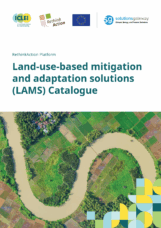Brief Description
To support local governments, experts, and citizens in making informed decisions on land-based climate strategies, the RethinkAction Framework was developed to provide tailored solutions for land-based climate change mitigation and adaptation. At its core is the RethinkAction Platform and its three main tools (or “paths”):
- LAMS Catalogue Tool (PATH A)
- Local Analysis Tool (PATH B)
- EU/Global Analysis Tool (PATH C)
The LAMS Catalogue is a collection of strategies, informed by IPCC reports and other scientific literature, which can help local governments navigate tangible and straightforward land-based solutions tailored to their territories’ and governmental needs and capacities. The RethinkAction Platform offers risk assessment analyses and insights on land-based strategies at local, European, and global scales, enabling users to access high-resolution climate data and maps, and provides the interface for decision-makers and the public to access the LAMS Catalogue. This platform was built using the RethinkAction methodology as part of the EU Horizon-funded RethinkAction project. Local authorities can replicate the methodology for application in their territories, guided by the RethinkAction Massive Open Online Course (or MOOC), a free, self-guided, interactive online course available on the RethinkAction homepage at RethinkAction.eu.
Relevance
Land is both a source and a sink of greenhouse gas (GHG) emissions: according to the IPCC, the sector of “Agriculture, Forestry and Other Land Use” (AFOLU) has contributed to 23% of global GHG emissions between 2007 and 2016[2], and it absorbs approximately 30% of all carbon emissions[3]. Beyond its role in the carbon cycle and mitigation strategies, land ecosystems are also highly vulnerable to climate change and extreme weather events such as flooding, droughts, heatwaves, and wildfires, which threaten ecosystem services, biodiversity, and human well-being, including in cities.
For these reasons, land-based strategies are crucial to achieving global mitigation and adaptation goals, particularly at the local level. By promoting sustainable land management, local governments can enhance the capacity of soils and ecosystems to absorb carbon, contributing directly to climate change mitigation targets. At the same time, through nature-based solutions, sustainable urban development, and integrated land-use planning, they can leverage land as an invaluable resource to strengthen resilience against climate impacts such as flooding, drought, and heat stress.
The RethinkAction platform was developed to support policymakers, citizens, and experts in identifying and implementing sustainable land-based mitigation and adaptation strategies that address these issues and needs, ultimately driving the transition toward low-carbon, resilient territories.
[1] IPCC, 2019. “Summary for Policymakers”, In: Climate Change and Land: an IPCC special report on climate change, desertification, land degradation, sustainable land management, food security, and greenhouse gas fluxes in terrestrial ecosystems [P.R. Shukla, J. Skea, E. Calvo Buendia, V. Masson-Delmotte, H.- O. Pörtner, D. C. Roberts, P. Zhai, R. Slade, S. Connors, R. van Diemen, M. Ferrat, E. Haughey, S. Luz, S. Neogi, M. Pathak, J. Petzold, J. Portugal Pereira, P. Vyas, E. Huntley, K. Kissick, M. Belkacemi, J. Malley, (eds.)].
[2] Jia, G., E. Shevliakova, P. Artaxo, N. De Noblet-Ducoudré, R. Houghton, J. House, K. Kitajima, C. Lennard, A. Popp, A. Sirin, R. Sukumar, L. Verchot, 2019. “Land–climate interactions”, In: Climate Change and Land: an IPCC special report on climate change, desertification, land degradation, sustainable land management, food security, and greenhouse gas fluxes in terrestrial ecosystems [P.R. Shukla, J. Skea, E. Calvo Buendia, V. Masson-Delmotte, H.-O. Pörtner, D.C. Roberts, P. Zhai, R. Slade, S. Connors, R. van Diemen, M. Ferrat, E. Haughey, S. Luz, S. Neogi, M. Pathak, J. Petzold, J. Portugal Pereira, P. Vyas, E. Huntley, K. Kissick, M, Belkacemi, J. Malley, (eds.)].
[3] United Nations Convention to Combat Desertification, n.d.. “Land-based solutions offer a key opportunity for climate mitigation”.
Main impacts
- Sustainable land management (urban and agricultural)
- Higher environmental quality (air, noise, water, biodiversity, nature)
- Development and protection of green spaces in urban settlements
- Protection of land-based ecosystems, their services, and biodiversity
- Resilience potential
- Climate change mitigation potential
Benefits
-
Limited urban sprawl
-
Increased share of greenery in urban areas
-
Reduced deforestation
-
Restored ecosystems
-
Spatial planning for sustainable energy production
-
Healthier freshwater ecosystems
-
Reduced levels of air pollution
-
Decreased levels of noise pollution
-
Increased resilience of territories to extreme weather and climate events
-
Decreased greenhouse gas emissions

RethinkAction Platform: LAMS Catalogue
The RethinkAction Platform supports local and regional stakeholders in addressing …

RethinkAction Platform: multi-level analyses of land-use-based mitigation and adaptation solutions (LAMS)
The RethinkAction Platform supports local and regional stakeholders in addressing …